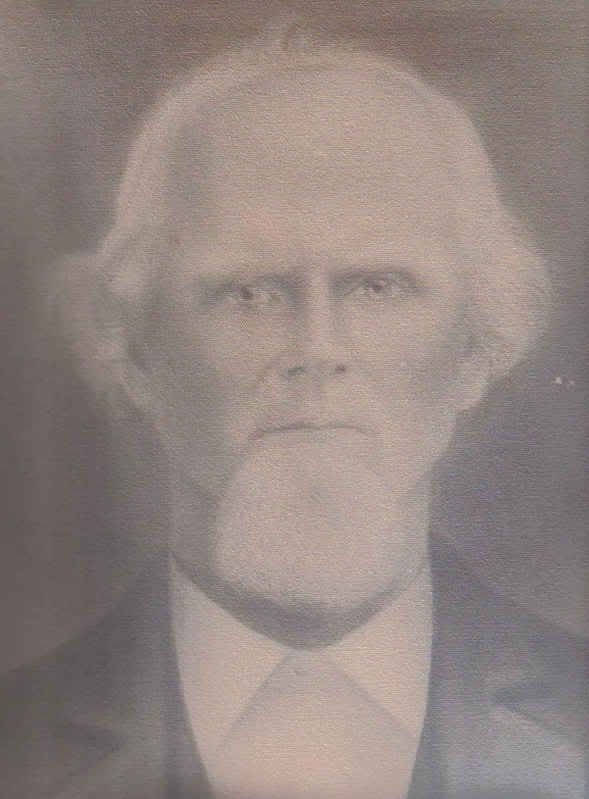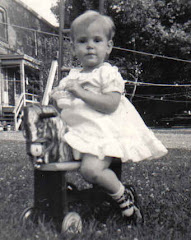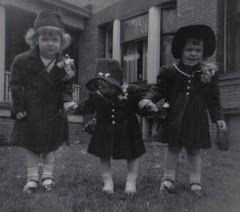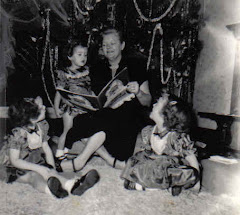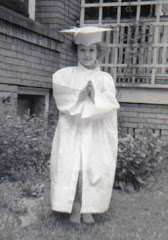Levi Campbell Roberts (my great-grandfather) was born December 13, 1827 in Sevier County, TN. At the time of his birth, the town of Sevierville was sparsely settled with only one main street. The first courthouse was a log structure. Large families were very common then, Levi being the eldest son of Elisha's and Gracy's nine children. Families worked hard building homes, making their own clothing and supplying enough food to feed their families. Women worked along side their husbands in the fields as well as taking care of the house. Many children meant many hands on the farm.
Entertainment consisted of fiddle playing and dancing, but because many the older people, who were primitive baptists, frowned on dancing, a new form of "swinging games" was played. We know these games as "square dancing" today. There was also "harp singing", which does not involve the harp at all. The origins of harp singing goes back centuries to England, but it really took root in the south. Harp singing is more like a shouting out, with stark harmonies that are haunting and raw.
The 1830 Census for Sevier County lists the following occupations: blacksmith headed the list, 6 doctors, 3 lawyers, 2 Methodist preachers, 8 Baptist preachers, wagon makers, carpenters, saddlers, merchants, 1 hatter, 1 cooper, 1 chair maker and 3 shoot and boot makers. Of course the majority of the residents at this time were farmers, which would continue until the Industrial Revolution.
Levi was born into a time of peace and as his father did before him, he farmed on a piece of land next door to his parents and also raised cattle. In 1850 he married Nancy Jane Russell, she was born November 1, 1827 in Jefferson County, TN. It is not known at this time who her parents were. Levi and Nancy had six children: John, Mary Jane, Martha D., Samuel Houston, Sarah, William Albert and an unknown female child. In 1860 he was the Constable of Sevier County.
When their last child was born, the world as they knew it was changing, war had once more entered the lives of Sevier Countians, and this war would see brothers, cousins, fathers and sons on opposing sides. Levi served in the Home Guard and five of his brothers joined the Union Army, CoM 2nd Tennessee Cavalry.
The war took a toll on the citizens of Sevier County, with raiding by the Union and Confederate troops. On September 8, 1863 his father, Elisha, died and Levi was now the head of the family. Then just a little over a year later on April 30, 1864 his mother, Gracey, died of meningitis. His young wife, Nancy, who was probably nursing her mother-in-law succumbed, along with an infant, daughter one day later to the same illness. Nancy and her infant daughter are buried in the same grave next to Levi's parents at Alderbranch Cemetery.
Levi was now left alone to raise his six young children. On November 9, 1865 he married Harriet Kerr (my great-grandmother). Census records show that Harriet, as well as giving birth to eight children of her own, raised the youngest child, William Albert Roberts, of Levi and Nancy. Levi and Nancy's children at the time of her death ranged from the ages of 14 to 1. It is not known who raised the other children of Levi and Nancy. Perhaps they were raised by relatives of Nancy and it is also possible that the older ones may have been apprenticed out to learn trades. It is also interesting to note that the children of his first wife are not mentioned in his will.
Children of Levi and Harriet (Kerr) Roberts: Nancy Ann, Grace Elzora, Joseph Harrison, Laura Belle, Isaac Newton, Amanda, James H. and Sara.
Harriet Kerr Roberts died in 1885 and Levi later posted guardianship bond for their minor children. Harriet and Levi were buried in the Kerr Family Cemetery, their remains were later re-interred by the TVA to Union Grove Cemetery in Sevier County.
Guardianship Bonds
Ward Guardian Heir Of
Roberts, Garce E. Roberts, L.C. Harriet 1888/1892
Isaac N. Roberts ditto
James H. Roberts 1888
Joseph H. Roberts 1892
Laura B. Roberts 1888
Sara Roberts 1892
WILL OF LEVI C. ROBERTS
Will Book 1
Page 504-506
I, LEVI C. ROBERTS of Millican, County of Sevier and State of Tennessee, being of sound mind and considering the uncertainty of life, do therefore make and declare this to be my last Will and
Testament.
FIRST I order that my Executor herein after named pay all my just debts and funeral expenses as soon after my decease as conveniently may be.
SECOND That my Executor sell a parcel of land known as the John Knight place containing 18 acres more or less, also a parcel or lot of land, beginning at a stake near Albert Roberts, then running up the main hollow to a big white oak tree a side line between McTrotter and myself this boundary lays northeast of the main hollow number of acres not estimated and in the event that the aforesaid lands does not pay all my just debts I authorize my Executor to sell one parcel or lot of land lying on the northeast of my home farm, beginning on a white oak corner of a lot of land of my wife Harriett and running with the top of the ridge northwest to a post oak corner of my own and McTrotter and if this lot should bring more money than it takes to pay my just debts I want the remainder equally divided between my five youngest children, to wit: Nancy A. and Gracy E. and Joseph H. and Laura B. and Isaac N. and that Nancy A. and Isaac N. have the old residence and there be no deduction of their part of land for said residence and that I give Joseph H. 1 Bay Mule and I give Isaac N. 1 Mouse colbred Mule and I give and bequeath to Nancy A. 1 milk cow and one heifer calf and 1 sheep and 1 brood sow the oldest one on the farm and that Isaac N. have 1 young brood sow and that I give and bequeath to Nancy A. five head of stock hogs for to fatten for the meat of my family that I have at home and that I bequeathto Nancy A. what corn is in my crib for the use of the family at home and also what wheat and oats that I have at present. An I bequeath to Isaac N., 1 wagon and all the farming tools that I have and that my land that I have beqeathed to my children above named to be divided with them when the youngest becomes twenty-one years of age. And that my Executor sell annually the rents of the aforesaid farms until it be divided and that the proceeds to be equally divided between my five youngest children. And that my Executor sell remainder of my stock hogs 10 in number and 2 young steers and pay the same to my creditors. And if there should be any legacy coming to me from any source I want it divided equally between all of my heirs in case it is not necessary to pay it out on my debts.
I appoint Eli H. Roberts to be Executor of this my Last Will and Testament hereby revoking all former wills by me made.
In witness whereof I have hereunto subscribed my name and affixed my seal this 11th day of September, 1896.
L. C. ROBERTS
witnesses: Joshua Atchley
Noah Haggard
Admitted to probate, September 19, 1896.
W. C. Large - Deputy Clerk
The Albert Roberts mentioned in Levi's will is William Albert Roberts, his son by Nancy. There is a deed registered for land that he sold his son next door to him.
State of Tennessee
Sevier County
Deed Book
I L.C. Roberts have this day bargained and sold and do hereby transfer and convey unto W.A. Roberts and his heirs and assigns forever for the consideration of ninety dollars to me in hand paid a tract or parcel of land in the State of Tennessee, Sevier County and in District No. 7 containing by estimation seven acres and 20 rod be the same more or less and bounded as follows; Beginning at a white oak corner to W.M. Finchum's land and runs S 39 W 21 1/3 poles to a post oak S 15 E 4 poles to a stake near a white oak N 70 W 29 poles to a stake at stable door N 41 W 14 poles to a stake at the fence N 551/2 E 71/2 poles to a cedar N 491/2 E 341/2 poles to a stake on W.M. Finchums line S 35 E 28 poles with the same to the beginning to have and to hold the same to the said W.A. Roberts his heirs or assigns forever. We do covenant with the said W.A. Roberts that I am lawfully siezed of said land, have a good right to convey it, and the same in unincumbered. I do further covenant and bind myself my heirs and Representatives to warrant and forever defend the title to the foregoing described tract of land and every part thereof to the said W. A. Roberts his heirs or assigns against the lawful claims of all persons whatever this the 31 day of October 1890.
L.C. Roberts (seal)
J.J. Ellis, Clerk of the County Court
To be continued ...
Saturday, June 28, 2008
Monday, June 9, 2008
A Child is born ...
“When chill November's surly blast make fields and forest bare.” ~ Robert Burns

Isaac and his wife are now living in their own cabin built of logs from trees they cleared from their land. It has two rooms and a loft. The fireplace in the main room, which serves as living and dining area, is built from fieldstone. Isaac has fashioned a rough-hewn cupboard for his wife to hold her dishes, a stone pitcher and crock, a coffee mill and her prized Delph pitcher. Isaac spent hours fashioning a mantle out of white oak. In anticipation of the coming birth of their first born child he has also bartered his labor to a widowed neighbor for a woven cradle.
The fields lie fallow, the root cellar holds barrels of salted meat, baskets of root crops and dried fruits. Bunches of herbs have been tied and hung from rafters in the loft. The barn made out of logs, like the cabin, is occupied by a milk cow, several sheep and chickens. All is ready for the coming cold months ahead.
Isaac has gone to the barn while the midwife and neighbor women attend to his wife. She has been in labor for hours. He can hear his wife's cries as she struggles to bring their child into the world. He thinks of the many women who have died in childbirth, and he sends a silent prayer up that he will not be digging a grave but celebrating a birth.
Elisha was born on November 16, 1799, just one year after Tennessee became the 16th state to join the union. His mother would go on to have three more children that we know of; Judith, Isaac and another sister. Isaac and his wife died sometime before 1850, the exact location of their graves is not known, but I was told by another researcher that a section of graves at the Alderbranch Cemetery have sunk over the years along with their headstones. Since most of the Roberts' are buried in this cemetery, I assume that Isaac and his wife are also.
The following was found in the Sevier County Courthouse ...
This following Indenture is between Elisha Roberts and W. F. Nichols both of Sevier County, Tennessee.
State of Tennessee
Sevier County
Deed Book
I Elisha Roberts have this day bargained and sold and do hereby transfer and convey to W. F. Nichols and his heirs forever for the consideration of six hundred and seventy five dollars to me in hand paid a tract of land in the State of Tennessee, Sevier County, and District No. 7 containing by estimationThirty Acres be the same more or less and bounded as follows beginning on a stake on the Bank of French Broad River then up the same North 49 East 11 poles to a stake corner to 1st lot then with the same South 62 East 203 poles to a stake South 82 East 50 poles to a white oak on the bank of Millican Creek then with same South 10 West 20 poles to a stake South 301/2 West 20 poles to a stake on the line between lots No. 2 and 3 then South same North 75 West 14 poles to a sweetgum North 59 West 135 poles to a stake North 62 West 110 poles to the beginning. To have and to hold the same to the said W. F. Nichols his heirs and assigns forever I do covenant with the said W.F. Nichols that I am lawfully seized of said land have a good right to convey it and that the same is unincumbered I do further covenant and bind myself my heirs and representatives to warrant and forever defend the title to the said land and every part thereof to the said W.F. Nichols his heirs and assigns against the lawful claims of all persons whatever this 24th day of July 1858.
Elisha Roberts (seal)
Test: G. W. Hill
Thos. Atchley
Note: Was Elisha selling land left to him by his father? The Sevier County Courthouse burned down in the mid 1850's and early records are lost to us forever, except for the few (like this) that survived, we will never know.
Elisha, like his father before him, was a farmer and spent his entire life on the land he was born on. He lived next door to his parents, probably on a piece of land divided off of Isaac's homestead. He married Grace Reed on September 23, 1825 in Sevier County, Tn. and died September 8, 1863, cause of death was dropsy. He was a member of the Alderbranch Baptist Church and he and Grace are both buried in the Alderbranch Cemetery. Grace (Reed) Roberts was born August 30, 1806 in Sevier County the second child of Joseph Reed and Nancy McCarter. She died April 30, 1864 from meningitis. When Elisha died his children equally divided his land and assets. Grace's father died when she was a young girl and the following was published in the Knoxville Gazette.
Wilson's Knoxville Gazette, Monday 6 September 1812 ...."William Mitchell, Sheriff of Sevier County, to sell interests of John Reed, Nancy Reed, Jeremiah Reed, Gracy Reed, heirs of Joseph Reed, deceased, 341/2 acres of land in Poor Valley, adjoining John Williams, Mitchell Reed Sr."
Elisha and Grace had nine children. Grace watched as five or her sons left home to join the Union Army during the War Between the States (Civil War), one of them did not return home. They all served in Co. M of the 2nd Tennessee Cavalry. Her oldest son, Levi, was a member of the Homeguard (our National Guard of today).
Children of Elisha and Grace:
Levi Campbell Roberts, b. December 13, 1827, Sevier Co., Tennessee; d. 1896, Sevier Co., Tennessee/Union Grove Cemetery
John Sevier Roberts, b. June 04, 1830, Sevier County,Tennessee; d. September 24, 1907, Sevier County, Tennessee/Old Gist Creek Cemetary
William Mitchell Roberts, b. December 14, 1833, Sevier Co., Tennessee; d. December 23, 1901, Sevier Co., Tennessee/Providence Cemetery
Nancy Angeline Roberts, b. May 29, 1835, Sevier Co., Tennessee; d. March 27, 1888, Sevier Co., Tennessee
Albert Galloway Roberts, b. June 01, 1837, Sevier Co., Tennessee; d. March 22, 1863, Murfreesboro, Tennessee.
Notes for Albert G. Roberts:
Albert served in Co. M 2nd Tennessee Cavalry. He died in a field hospital in Murfreesboro, Tennessee
of pneumonia. He enlisted November 8, 1862 and his rank was Private.
Name: A. G. Roberts (Alias Albert G. Roberts)
Rank: Private
State Served: Tennessee
Unit: 2nd Cavalry Regiment
Company: M
Date of Death: 22 MAR 1863
Cemetery: Stones River National Cemetery
Location: Rutherford County, TN
Section: D
Grave Number: 1233
Eli Harrison Roberts, b. December 25, 1840, Sevier Co., Tennessee; d. August 21, 1916, Sevier Co., Tennessee/Alderbranch Cemetery
Elijah Houston Roberts, b. November 25, 1843, Sevier Co., Tennessee; d. February 03, 1907, Knox Co., Tennessee
Sarah Jane Roberts, b. May 14, 1846, Sevier Co., Tennessee
Joseph Birdwell Roberts, b. April 03, 1850, Sevier Co., Tennessee; d. March 18, 1929, Sevier Co., Tennessee/Union Grove Cemetery.
Elisha died intestate, the following was found in the Sevier County Courthouse:
Appearing to the Court that Elisha Roberts a Citizen of Sevier County had died intestate having whilst living and at the time of his death goods and chattels rights and credits and thereupon the Court appointed Eli H. Roberts Administrator of the estate of the said Elisha Roberts deceased who appeared in open court and gave bond in the sum of fifteen hundred dollars with L. C. Roberts and John Roberts as his securities who was thereupon duly qualified as Administrator of the Estate of the said Elisha Roberts decd., and thereupon letters of Administration issued to said Eli H. Roberts which is in the words and figures following to wit: To Eli H. Roberts Greeting, Whereas is has been represented unto us in our County Court held for the County of Sevier at the Courthouse in Sevierville on the 10th day of April, 1866 that Elisha Roberts late of said county had died intestate having whilst living and at the time of his death goods and chattels rights and credits the ordering and granting administration whereof doth appertain to us and we being desirous that said goods and chattels rights and credits well and truly and faithfully administered to grant unto the said Eli H. Roberts full power by these present well and truly to collect and take into their possession all and singular the goods and chattels rights and credits which were of the estate of the Elisha Roberts at the time of his death wheresoever the same may be found requiring you to make or cause to be made and returned into our said court at the next term a true and perfect account of said administration when thereto required.
Witness: H.H. Duggan, Clerk of said county at office in Sevierville this 10th day of April, 1866. Estate Book/Sevier County Courthouse Page 347-348
The following inventory of Elisha's estate gives us a window into how he and Grace lived at the time of his death, which was not much different than his father before him.
Inventory & list of sales of the property belonging to the estate of Elisha Roberts sold the 9th day of June 1866.
Wm M. Roberts - one milk cow $10.10
Eli H. Roberts - one log chain 1.00
Eli H. Roberts - one set timber wheels 5.00
Houston E. Roberts - one cast plow 1.00
Wm. Jones - one pair stretchers .65
Houston E. Roberts - one matlock .25
Eli H. Roberts - one axe .10
Houston E. Roberts - five head of sheep 3.50
G.W.Hill - five head of sheep 2.50
Eli H. Roberts - the remainder of the lot 2.50
Wm. M. Roberts - sundry tools 1.75
Wm. Jones - one set of breeching rings .10
Houston E. Roberts - one deep oven 1.60
Houston E. Roberts - one biscuit oven 1.25
Houston E. Roberts - one dinner pot .60
Houston E. Roberts - one wash pot 2.25
Eli H. Roberts - one iron wedge .20
Sarah J. Roberts - one wievers loom & two reeds .50
Eli H. Roberts - one dining table 1.75
Samuel F. Sarrett - one frying pan .25
Sarah J. Roberts - one stone pitcher & crock .20
Sarah J. Roberts - one smoothing iron .05
Sarah Ann Flinn - one coffee mill .10
Sarah J. Roberts - one delph pitcher .05
Eli H. Roberts - one cupboard & dishes 1.00
Houston E. Roberts - one meal tub tray & seive .10
Wm. Jones - one molasses barrel 1.00
Houston E. Roberts - one lard can .10
Sarah J. Roberts - one check reel .25
Sarah J. Roberts - one churn & wate pail .05
G.W. Hill - one lot nine chairs 2.50
Sarah J. Roberts - one side saddle .65
Wm. M. Roberts - one chest .25
Sarah J. Roberts - one small table .05
Eli H. Roberts - one clock .50
Houston E. Roberts - one bedstead .50
Joseph B. Roberts - 2 small bedsteads .10
Wm. M. Roberts - one feather bed & 3 pillows .50
Eli H. Roberts - one feather bed & 3 pillows .30
Joseph B. Roberts - one feather & straw tick six sheets .25
Sarah J. Roberts - one counterpane & quilt .50
Joseph B. Roberts - one straw tick & quilt .25
Eli H. Roberts - two straw ticks blanket,quilt & sheet .75
Wm. M. Roberts - one straw tick & blanket .25
G.W. Hill - one flax wheel .40
Joseph B. Roberts - four geese .35
Saml H. Sarrett - 1 scythe blade & cutting knife .15
L.C. Roberts - 1 scythe blade .25
Houston E. Roberts - one wash tub .25
Houston E. Roberts - one set fire dogs .50
Houston E. Roberts - one fire shovel .25
______
TOTAL $49.15
Eli H. Roberts, Administrator
Sworn to before me this 19th July 1866
W.M. Burnett, D.C.
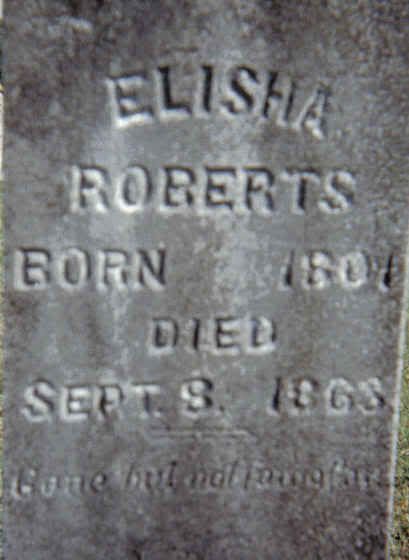
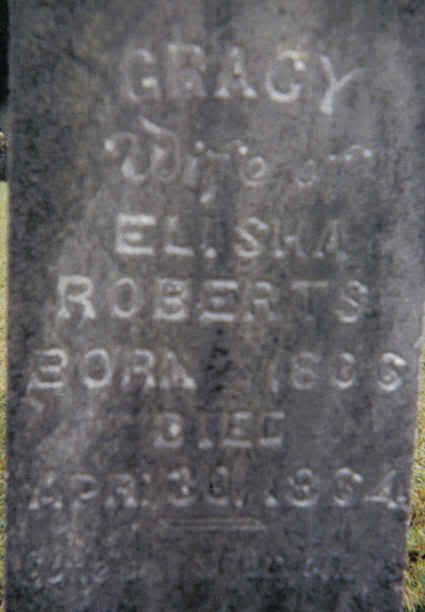
Levi Roberts, eldest son of Elisha and Gracy, is my greatgrandfather.
To be continued ...
Friday, June 6, 2008
Territory South of the River Ohio ..
According to Isaac Roberts' grandson, Isaac came to Tennessee from North Carolina, however I have never been able to verify this. I do know that white settlers had been slowly moving into the back country of Virginia and North Carolina long before the start of the American Revolution. In fact, East Tennessee had become overcrowded, and more land was needed for the influx of pioneers pouring into the area from Southwest Virginia who were following the route of the American forces as low as the French Broad River and were erecting cabins.
Some of the early Roberts' families of Sevier County are found in early tax lists of Virginia, so it is possible that Isaac came from the same area as a young man. He was old enough to have fought in the Battle of Kings Mountain, as well as the Battle of Boyd's Creek. No documentation has been found to substantiate either claim at this time. I am going with the supposition that Isaac traveled with a wife, until future documentation proves otherwise.
My story of Isaac, as I imagine it was ....
Isaac traveled with kin and neighbors into the back country of what was then the western borders of Virginia and North Carolina. These migrations are found throughout the early history of our country, and I am amazed at how often our ancestors traveled until they found a spot to call home and put down roots. Isaac would have brought with him an axe, knife and a long rifle. If he was married at the time, his wife would have gathered her few worldly goods; pots, skillets, spinning wheel, dishes that she brought with her from across the pond (or mostly likely plates and spoons carved from wood) a milk cow if she had one, sheep (raised for clothing and food) and whatever else that was potable. They traveled by foot, pulling a cart with their belongings. If they were lucky enough to own a horse, they would take turns riding, but mostly they walked.

When Isaac and his wife first arrived in the Flat Creek area of what is now Sevier County, TN they probably lived in a cave carved out of a hill while they cleared the land for crops. Their temporary home would have consisted of just one room with a fireplace for cooking and heat, a bench and a table and chairs, a large chest would have held their clothing and linens. Later this cave could be used as a root cellar. There also would have been a fresh spring that they would build a small stone building around for storing eggs, milk and whatever else would have been perishable (a spring house).
When they cleared their land, they would have set aside the logs for building their cabin, but getting a crop in the ground took priority. They would harvest in the fall, before the frost set in. Isaac, along with the other men of their small community, would hunt birds and animals for food for the family table. Meat would be stored in large barrels filled with salt for the winter months ahead.
Isaac's wife's days would have been spent doing chores. She would rise early, to feed the chickens and gather eggs, milk the cow, water the horse and mule, pick berries from the forest, gather produce from their gardens, peas, onions, turnips, carrots and whatever else they had planted. Then she would cook breakfast, probably a simple meal of biscuits and porridge. There would also be a midday and evening meal to cook. All of which meant gathering wood for the fireplace because few early female pioneers had stoves. The floor was made from packed dirt that had to be swept daily. The babies and children had to be cared for and when ill, treated with herbal remedies. Many women died in childbirth and men would remarry quickly to have someone to raise their children. Some children would be indentured out to learn a trade, some as young as six years old. Bathing meant boiling large amounts of water, so they probably just washed from a pan of hot water each day. A large kettle over a fire would be set up for washing clothes, an iron heated over the fire for ironing. Wool would be spun and then weaved for clothing, candles and soap made from tallow. The tallow would be made by rendering fat down in a large kettle over an open fire. There were no schools, the only book in the home was probably a bible. Verses would be read each evening, and mother's who could read and write would teach their children "the three r's" using slate and chalk. The bible was also where they recorded the births, deaths and marriages of family members.
Isaac and his wife would have been totally self-reliant, and met their needs without help from anyone else. Whatever they did not grow or raise was bartered for.
Then there was the constant threat from the Native Americans, because our ancestors were intruders who had, in some cases, settled on Indian lands. Forts would be built where the settlers could gather for safety from Indian attacks, but many times a simple hunt for herbs, mushrooms or even a hunting trip meant danger was always present.
......and into this harsh environment my great-great grandfather, Elisha Roberts, was born.
To be continued ...
Some of the early Roberts' families of Sevier County are found in early tax lists of Virginia, so it is possible that Isaac came from the same area as a young man. He was old enough to have fought in the Battle of Kings Mountain, as well as the Battle of Boyd's Creek. No documentation has been found to substantiate either claim at this time. I am going with the supposition that Isaac traveled with a wife, until future documentation proves otherwise.
My story of Isaac, as I imagine it was ....
Isaac traveled with kin and neighbors into the back country of what was then the western borders of Virginia and North Carolina. These migrations are found throughout the early history of our country, and I am amazed at how often our ancestors traveled until they found a spot to call home and put down roots. Isaac would have brought with him an axe, knife and a long rifle. If he was married at the time, his wife would have gathered her few worldly goods; pots, skillets, spinning wheel, dishes that she brought with her from across the pond (or mostly likely plates and spoons carved from wood) a milk cow if she had one, sheep (raised for clothing and food) and whatever else that was potable. They traveled by foot, pulling a cart with their belongings. If they were lucky enough to own a horse, they would take turns riding, but mostly they walked.

When Isaac and his wife first arrived in the Flat Creek area of what is now Sevier County, TN they probably lived in a cave carved out of a hill while they cleared the land for crops. Their temporary home would have consisted of just one room with a fireplace for cooking and heat, a bench and a table and chairs, a large chest would have held their clothing and linens. Later this cave could be used as a root cellar. There also would have been a fresh spring that they would build a small stone building around for storing eggs, milk and whatever else would have been perishable (a spring house).
When they cleared their land, they would have set aside the logs for building their cabin, but getting a crop in the ground took priority. They would harvest in the fall, before the frost set in. Isaac, along with the other men of their small community, would hunt birds and animals for food for the family table. Meat would be stored in large barrels filled with salt for the winter months ahead.
....."men work from dawn to dusk and a woman's work is never done"
Isaac's wife's days would have been spent doing chores. She would rise early, to feed the chickens and gather eggs, milk the cow, water the horse and mule, pick berries from the forest, gather produce from their gardens, peas, onions, turnips, carrots and whatever else they had planted. Then she would cook breakfast, probably a simple meal of biscuits and porridge. There would also be a midday and evening meal to cook. All of which meant gathering wood for the fireplace because few early female pioneers had stoves. The floor was made from packed dirt that had to be swept daily. The babies and children had to be cared for and when ill, treated with herbal remedies. Many women died in childbirth and men would remarry quickly to have someone to raise their children. Some children would be indentured out to learn a trade, some as young as six years old. Bathing meant boiling large amounts of water, so they probably just washed from a pan of hot water each day. A large kettle over a fire would be set up for washing clothes, an iron heated over the fire for ironing. Wool would be spun and then weaved for clothing, candles and soap made from tallow. The tallow would be made by rendering fat down in a large kettle over an open fire. There were no schools, the only book in the home was probably a bible. Verses would be read each evening, and mother's who could read and write would teach their children "the three r's" using slate and chalk. The bible was also where they recorded the births, deaths and marriages of family members.
Isaac and his wife would have been totally self-reliant, and met their needs without help from anyone else. Whatever they did not grow or raise was bartered for.
Then there was the constant threat from the Native Americans, because our ancestors were intruders who had, in some cases, settled on Indian lands. Forts would be built where the settlers could gather for safety from Indian attacks, but many times a simple hunt for herbs, mushrooms or even a hunting trip meant danger was always present.
......and into this harsh environment my great-great grandfather, Elisha Roberts, was born.
To be continued ...
Subscribe to:
Posts (Atom)
